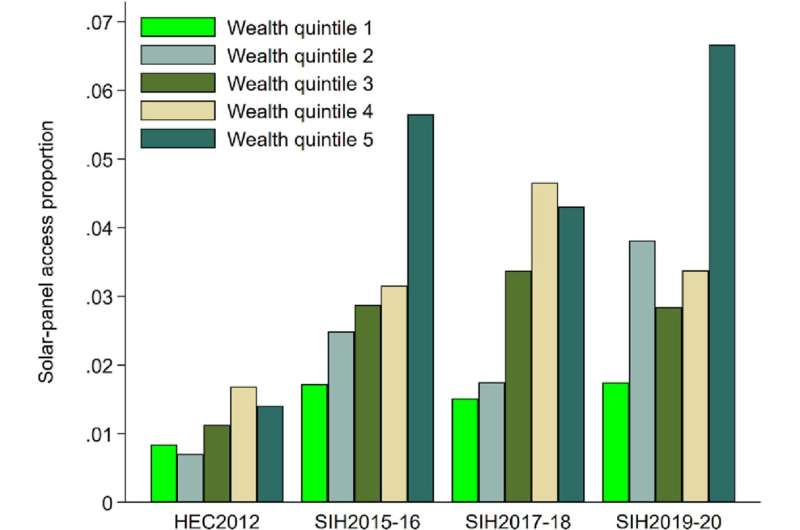
With soaring rent stress rife in Australian capital cities, new research has found many tenants are also missing out on energy savings due to lack of access to solar panels.
In a new paper co-authored by Macquarie Business School economists Rohan Best and Andrea Chareunsy, and the Macquarie Law School's Madeline Taylor, researchers found more than 90% of tenants in Australia lack direct access to solar panels.
The paper, "Emerging inequality in solar panel access among Australian renters," was published in the journal Technological Forecasting and Social Change. As part of the project, researchers analyzed data from the Australian Bureau of Statistics for more than 17,000 renters surveyed between 2012 and 2020.
The study found wealthy renters are more likely to benefit from properties with solar power access, and the savings made translate to more disposable income to spend on consumer items or investments.
Dr. Rohan Best said this is adding to the widening gap between high-wealth renters and low-wealth renters.
"As far as we are aware this paper provides the first study on changes in the inequality of access to solar panels by renters," Dr. Best says.
"Greater understanding of this landscape is important to support policy enhancements for this large and sometimes disadvantaged social group."
The analysis of solar panels in rental properties shows renters with large amounts of assets being substantially more likely to have access to solar panels than those with fewer assets.
"In some cases renters can save hundreds a year if not a thousand depending on electricity usage, that's significant savings when things are tough. With budgets being so tight, people can save on their electricity bills, and then use these savings for other cost of living expenses. Targeting landlords may be the most effective mechanism for change. Incentives could help persuade them to install the panels and savings are then partly passed on to the tenant," Dr. Best says.
After assessing a range of socio-economic aspects, the research team found that net wealth was better for identifying solar-access inequality than other socio-economic variables such as income, welfare receipt, or education.
"We also found differences in solar panel access based on the type of relationships between tenants and individual landlords," Dr. Best said.
"This is an important context as some renters are already disadvantaged—before even considering further disadvantage from lack of access to technological innovations."
How to improve access to solar panels
Dr. Best said the research findings could be used to support policy development and new legislation to halt the widening gap between renters who have access to solar panels and those who don't.
"One solution could be to means test renters to ensure people with the least resources could be supported the most. For example, rebates could be higher for the least wealthy 20% of renters compared with wealthy renters who are often paying the highest amount of rent per month in more expensive suburbs."
"Although the paper didn't focus heavily on public housing, there is no doubt that if residents had access to solar panels it would reduce their electricity bills substantially. Researchers and policy makers need to urgently focus more on this sector," Dr. Rohan says.
"Long leases could be another solution. If landlords secure long-term tenants they may be more inclined to invest in solar panels and absorb the costs in a sustainable rent price schedule.
"Targeting landlords may be the most effective mechanism for change. Incentives could help persuade them to install the panels and savings are then partly passed onto the tenant."
Dr. Best says Victoria already has a scheme where tenants can contribute to the cost of solar panels to help lower their electricity bills.
"Simple, equitable and efficient approaches are required. Ongoing discussion and further research offers hope towards refining policies and improving outcomes for renters."